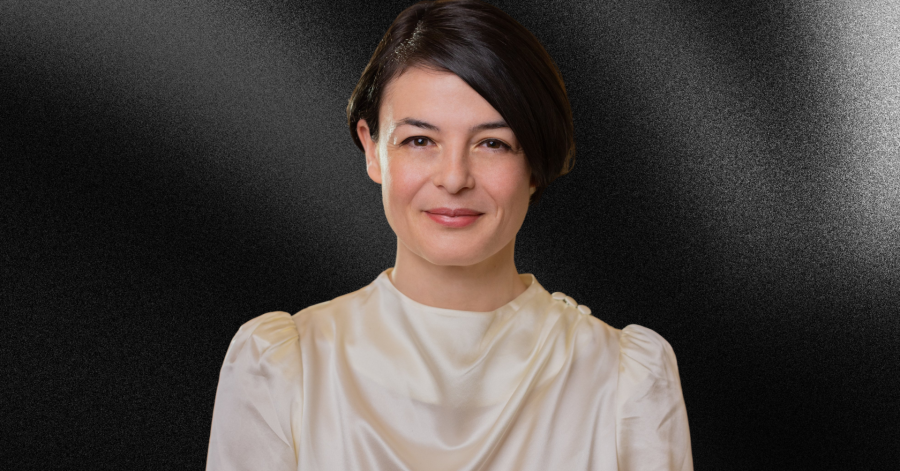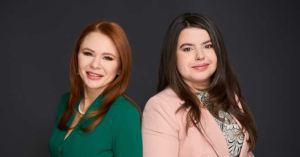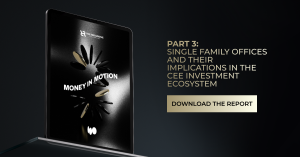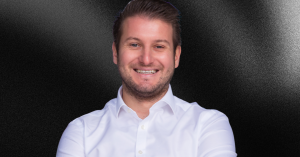When Angela De Giacomo stepped away from her role as an international tax specialist at KPMG to work directly with a wealthy family, she entered a world of nuanced capital decisions, personal relationships, and long-term vision. Over the past 12 years, she has advised two families—one Indian-American, the other German—on how to manage, grow, and preserve their wealth through structured family office setups.
Today, as Chief Investment Officer at Evalue Family Office, she oversees the wealth of Thomas Falk, a German serial tech entrepreneur who sold his first adtech company to Google via DoubleClick and has since become an active investor. The experience has given her a front-row seat to the evolving strategies of first-generation wealth holders—and the increasing relevance of venture capital in their portfolios.
Her insights also appear in Money in Motion, our latest report on High-Net-Worth Individuals in CEE.
👉 Download the report: High-Net-Worth Individuals in CEE: Investment Preferences and Trends
Why many wealthy Europeans don’t set up family offices
Despite rising wealth across the continent, family offices remain less common in Europe than in the US. The reason, De Giacomo says, is mostly structural. “It often comes down to scale. In our industry, setting up a professional family office only makes sense when you manage at least €100M. Below that, the cost of a full team—a CIO, a tax specialist, maybe a private banker—can be prohibitive.”
That helps explain the gap between Europe’s growing number of ultra-high-net-worth individuals (defined by banks as greater than $ 30M) and the relatively smaller number of institutionalized family offices. For those who do make the leap, though, the payoff is greater control, privacy, customization, and the ability to invest with conviction.
First-generation wealth, first-principles thinking
Those who make that leap often share a key trait: they built their own wealth. “One thing that one needs to understand,” De Giacomo explains, “is that both families I’ve worked with are first-generation wealth creators. They acquired their wealth during their own lifetime, which influences how they think and act.”
This background brings an entrepreneurial mindset to the table—one that is often driven by the goal of increasing wealth rather than merely preserving it. It’s a mindset that shows up clearly in how they allocate capital.
Venture capital at the core
Unlike many traditional European family offices, the principal De Giacomo has been working with since 2022, puts venture capital at the center of its strategy, investing both in direct startup investments and through funds. “The portfolio has around 30 to 40 direct investments, and almost the same amount in venture funds,” says De Giacomo. “When these cases do well, they outperform every other asset class. But you need patience and a strong portfolio composition.”
It’s not for the faint of heart. “You really have to have the financial means, the time horizon, and the stamina to endure a portfolio like that,” she adds. “Many of these direct investments will be written off, but a few outliers can significantly outperform.”
The office primarily invests at the Seed and Series A stage, where risks are higher but returns—if successful—can be transformative. In later rounds like Series B or C, the strategy shifts slightly. “You have a lower return profile, but also less volatility,” she notes. “You won’t hold 40 companies, but maybe 10 to 15.”
Building trust, building pipeline
Being active in venture is one thing—getting access to the best deals is another. That’s where the principal’s background as a founder and early-stage investor has been instrumental. “The pipeline was never an issue,” De Giacomo says. “He was known—first for his entrepreneurial success, then for co-founding a venture fund in New York over a decade ago.”
That kind of reputation builds trust and opens doors to top-tier founders and co-investors. But not every family starts from such a strong position. De Giacomo recalls a different experience with the Indian-American family she advised earlier in her career. “They didn’t have startup ecosystem exposure. They had to build their network from scratch—attending conferences, engaging with founders, proving themselves as thoughtful and supportive investors.”
In both cases, she emphasizes, trust is the currency of the venture world. “If you’re known for aggressive terms or poor founder treatment, you’ll quickly lose access to the best deals.”
The geography of return
One reason Evalue’s investments have a strong US-focus is because that is where the highest number of exits happen.“Most of our venture investments lean toward the US,” De Giacomo says. “That’s where most of the exits still happen.”
It’s not that Europe or India lack talent—far from it. But the exit environment matters. “In the US, companies are more acquisition-minded. In India, for example, despite the engineering talent, corporates often prefer to build in-house rather than buy. That limits exit opportunities.” A similar dynamic, she adds, exists in much of Europe, where acquisition cultures are still developing.
While the family office does have exposure to Central and Eastern Europe through one VC fund, De Giacomo is candid about its scale: “It’s one out of 35 fund investments.”
Beyond venture: real estate and private equity
Of course, venture is only part of the picture. The family office balances its portfolio with more stable, longer-term assets. Real estate is the second-largest pillar, followed by private equity funds, private debt, and public market investments.
That strategy stands in contrast to the Indian-American family, whose portfolio was more traditionally diversified. “They also invested in venture, but it wasn’t as significant a portion of their wealth,” she says. “They were more focused on stocks, bonds, real estate—and at the time, they weren’t doing private debt or secondaries.”
What comes next
As more first-generation founders across Europe exit their companies and think more strategically about wealth, the number of professionalized family offices is likely to rise. But the path is far from easy.
“It requires capital, long-term commitment, and an ecosystem mindset,” says De Giacomo. “Trust takes time. And if you’re serious about investing in venture, especially directly, you need to earn your place in that world.”
To share insights on how family offices view and can increase their involvement in venture capital, Angela De Giacomo has drawn on her 12 years of experience in the field to write a practical guide — The Venture Capital Playbook. You can find the book here: https://fazbuch.de/produkt/the-venture-capital-playbook/









